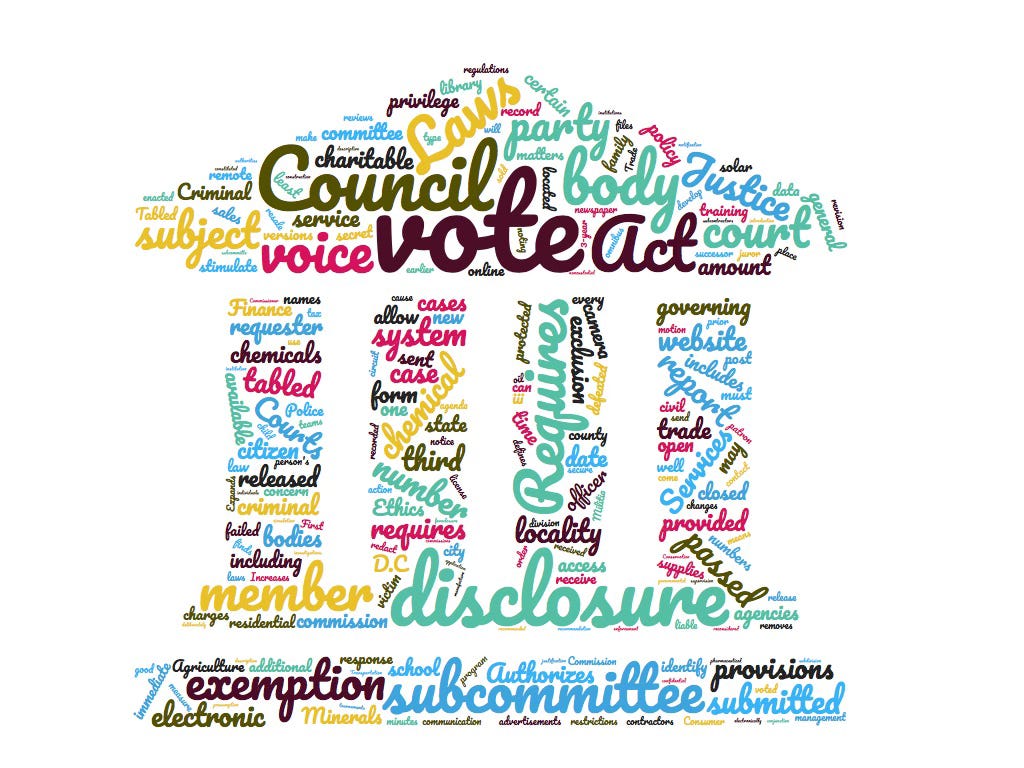The lobvocate's lament

The lobvocate's lament
At the General Assembly, sometimes the advocate and the lobbyist in me aren't compatible.
I may not be a contract lobbyist, but given how many different committees I find myself in discussing FOIA and transparency legislation, it often feels like I have as many clients as the professionals do instead of just one, VCOG.
Most years I spend the bulk of my time in House General Laws and Senate General Laws and Technology. Those are the committees that typically get the bills that directly amend FOIA with few other substantive changes. Additionally, because many FOIA issues affect localities or have legal implications, I also frequent the local government and the courts committees in both chambers. This year was no different.
However, since FOIA components often sneak into bills across various subject areas, I often find myself in several other committee rooms covering a wide array of topics.
I sat in on the education committees for the House and Senate because of bills dealing with name, image and likeness contracts for college athletes included FOIA components.
I was in the House and Senate Privileges and Elections Committees because that’s where the bill VCOG suggested to Del. Bulova to make the selection process to fill a local government or school board vacancy more consistent and transparent went.
I was in House Public Safety because of a bill dealing with the police officer decertification process that had a FOIA section added towards the end of its journey in the Senate. That committee also had a bill on a Department of Corrections Ombudsman that touched on FOIA.
I darkened the doorway of each side’s commerce and labor committees to deal with FOIA issues on bills dealing with the financial exploitation of elderly adults and with collective bargaining.
I touched on both chambers’ committees on agriculture and natural resources, which is where bills affecting animal welfare go, and which in my case meant bills on university research reliant on animal testing that, yep, included a bit on FOIA.
I went to House Rules to watch the resolution VCOG requested to study fees at the FOIA Council die on a voice vote. And though I went to the money committees for the House and Senate, those have very little public interaction. You’re mostly just going there to watch. But still, I watched.
So, by my count, I was working on bills assigned to 10 out of 14 House committees and 9 of 11 Senate committees. The only two subject matter committees I didn’t watch were those dealing with transportation and those dealing with social services and welfare. There’s also the House Finance Committee, which is the revenue side of the money process, and I didn’t need to be there this year.
My docket as a lobbyist illustrates that FOIA permeates all areas of law, emphasizing its significance for citizens, the press, researchers, and advocacy groups alike.
However, navigating the diverse topics that FOIA intersects with can sometimes stretch my expertise. While I excel in matters directly related to FOIA, I may find myself out over my skis on other issues. Financial exploitation of the elderly? Police decertification? Animal testing?
VCOG’s founding director and my mentor, Frosty Landon, taught me that half of the job as VCOG’s lobbyist is to show up so that people know who you are and why you’re there. You can be a resource and you can be the conscience.
The other half is picking your battles, balancing outright opposition to problematic FOIA bills with attempts to refine them as they plod through the legislative process.
When FOIA provisions are stuck into bigger bills with major new policy initiatives, or when bills have momentum because of who is carrying them or who supports them, it’s harder to effect real change. For those bills, the choice is whether to say “no” to the bill and risk it going through with FOIA provisions that are too broad, or to work with the patrons as the bill moves forward to narrow the FOIA posture as much as possible. That usually disappoints advocates (myself included!) and individuals who oppose the bill in its entirety, but I feel it’s the more responsible choice.
I was able to do that on many bills that went through this session, though some of my proposed amendments were disregarded or altered.
Ultimately, the patrons will do what they do, and the votes will fall where they may. Sometimes I’ll get a full glass and I’ll toast with that. Sometimes my glass is only half-full, though, but that half of a glass can be far better than an empty one.


Add new comment